The best cold-hardy privacy plants include American Arborvitae (zones 5-7), Leyland Cypress (zones 6-10), Evergreen Holly (with winter berries), Juniper (thriving in Zone 4), Boxwood (zones 5-9), Cedar (exceptional cold tolerance), and Winter-Flowering Clematis (for vertical coverage). You’ll appreciate their year-round screening capabilities, with many offering additional benefits like wildlife attraction or striking winter appearances. Discover how these seven resilient options can transform your outdoor space into a secluded sanctuary regardless of temperature challenges.
American Arborvitae: The Resilient Living Wall
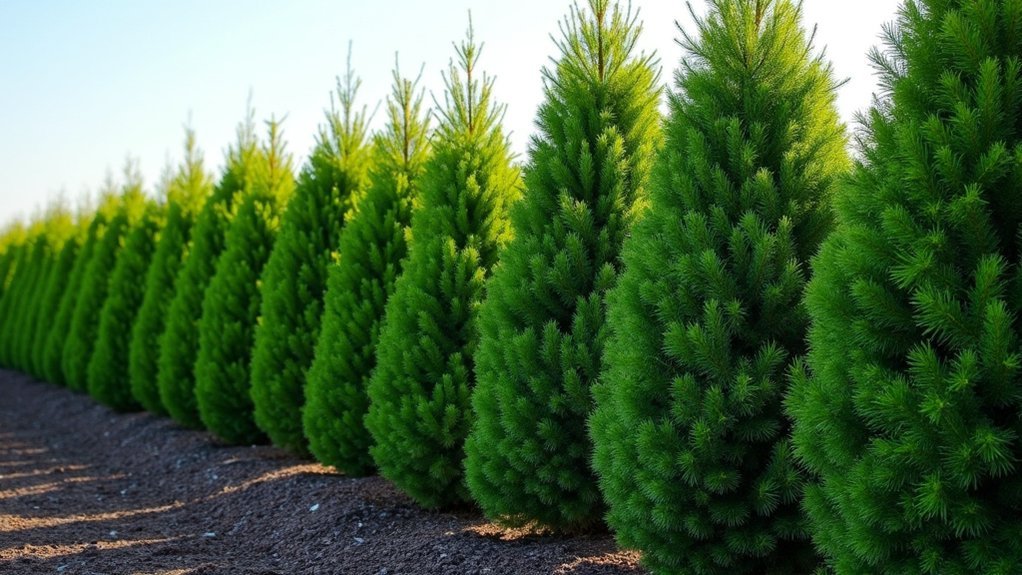
A fortress of greenery, the American Arborvitae (*Thuja occidentalis*) stands as nature’s perfect privacy solution for cold climates. This narrow, pyramid-shaped evergreen thrives in zones 5-7, offering year-round screening with its dense, lush foliage.
You’ll appreciate its adaptability to various soil conditions and minimal maintenance requirements. Once established, it’s drought-tolerant and needs infrequent watering, with pruning rarely necessary due to its naturally compact growth pattern. American Arborvitae grows impressively fast at up to 3 feet per year, making it an excellent choice for establishing privacy screens quickly.
The ‘American Pillar’ variety offers a space-efficient columnar form, ideal for smaller yards. Beyond privacy, these trees create windbreaks, support wildlife, and prevent soil erosion.
Perfectly columnar yet powerfully functional, ‘American Pillar’ maximizes small spaces while offering multiple environmental benefits.
Their resistance to pests and diseases means you’ll spend less time troubleshooting and more time enjoying the sophisticated greenery they bring to your landscape.
Evergreen Holly: Beautiful Berries With Robust Protection
While American Arborvitae offers columnar elegance, Evergreen Holly brings a different dimension to cold-climate privacy screens with its distinctive character.
These resilient shrubs reach 10-15 feet tall, with varieties like Nellie Stevens potentially growing to 35 feet in ideal conditions.
You’ll appreciate holly’s thick, evergreen foliage that provides year-round privacy when planted 5-6 feet apart. Beyond their practical function, hollies offer visual appeal with deep red winter berries that attract birds to your landscape.
These adaptable plants thrive in various soil conditions and climate zones, requiring only moderate maintenance through regular pruning. For optimal fruit production, ensure you have both male and female plants within 30-40 feet of each other, as hollies are dioecious with separate sexes.
For maximum screening effect, consider Nellie Stevens Holly, while Japanese or Chinese varieties work well for lower hedges.
Plant them in spring or fall in partial to full sun for best results.
Juniper: Dense Foliage That Withstands Frigid Temperatures
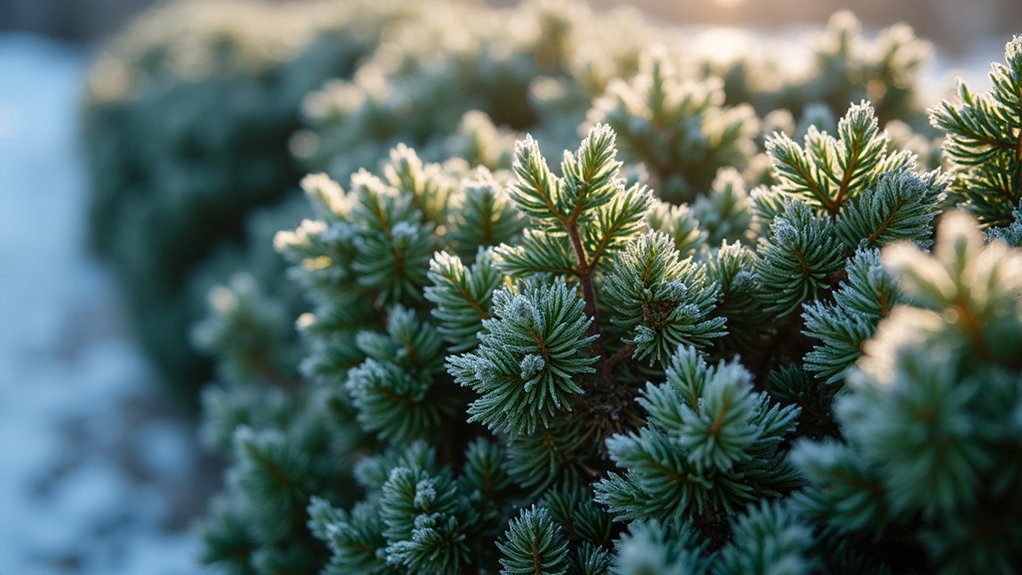
Junipers represent the ultimate cold-weather warriors for privacy screens, withstanding temperatures that would devastate less hardy plants.
Varieties like Wisconsin and Mountbatten thrive in Zone 4 conditions, making them perfect for northern landscapes.
Hardy Zone 4 junipers like Wisconsin and Mountbatten bring year-round privacy to even the most challenging northern climates.
For narrow spaces, consider Taylor Juniper, which grows rapidly (12-24″ annually) to 15-20′ tall while maintaining a slender profile.
If you’re looking for ground coverage, Glacier Juniper offers stunning silver-blue winter foliage that’s deer-resistant.
Moor-Dense® delivers exactly what its name promises—tight, bright green foliage that creates effective visual barriers while staying relatively compact at 2-3′ tall.
Most junipers require full sun and adapt to various soil types, from sandy to clay, making them remarkably low-maintenance options for your privacy needs. For optimal long-term health, annual pruning during the dormant season will promote denser growth and maintain the plant’s attractive appearance.
Boxwood: Classic Hedges For Year-Round Privacy
Boxwoods create a bulletproof privacy barrier with their dense, evergreen foliage that maintains structure even under heavy snow loads.
You’ll appreciate their impressive cold hardiness in zones 5-9, where they continue performing as reliable screens through harsh winters.
With varieties like Green Mountain and Green Velvet, you can easily shape these adaptable shrubs into formal hedges or more natural privacy screens to suit your landscape style. The low maintenance nature of established boxwoods makes them an excellent choice for busy homeowners looking to create lasting privacy screens with minimal upkeep.
Dense Evergreen Shield
The classic elegance of a well-maintained boxwood hedge offers more than just aesthetic appeal—it provides a dense, year-round privacy solution for any landscape.
With lustrous dark green foliage that remains vibrant through winter, boxwoods create an effective visual barrier and windbreak while sheltering wildlife.
You’ll appreciate their adaptability across USDA zones 5-9 and minimal maintenance requirements.
Though slow-growing, their patience-rewarding nature means less pruning while still achieving formal, neat borders up to 9-12 feet tall. The compact leaf structure effectively blocks both views and noise.
For best results, plant boxwoods where they’ll receive 4-6 hours of sunlight daily with protection from intense afternoon heat.
Consider varieties like Green Tower® for particularly narrow, vertical screens, or mix with flowering shrubs for added seasonal interest. Planting boxwoods closer together than single specimens creates a more effective screen while still allowing adequate airflow between plants.
Snow Load Resistance
When winter blankets your landscape with heavy snow, boxwood hedges stand resilient as guardians of privacy throughout the harshest conditions.
Varieties like ‘Green Mountain’ and ‘Green Velvet’ offer exceptional durability in zones 4-8, growing about 3 inches yearly.
To maximize their snow load resistance, plant boxwoods in protected north or east exposures. Healthy specimens in well-drained soil will better withstand winter stresses and maintain structural integrity under snow loads. Before winter, remove weak branches and late-season growth, then consider loosely wrapping mature specimens with burlap or wildlife netting.
When heavy snow accumulates, use a bamboo pole to gently brush it away before branches break.
For established hedges, tying branches with twine helps distribute weight evenly.
Remember that some snow actually benefits your boxwoods by providing insulation, so only intervene when absolutely necessary to maintain your year-round privacy screen.
Natural Shaping Flexibility
Among all the cold-hardy privacy screens, boxwood stands out for its exceptional natural shaping flexibility that’s simply unmatched by other evergreens. You’ll find varieties like ‘Green Mountain’ naturally maintain conical forms with minimal intervention, while others adapt to formal or informal designs. Regular pruning helps to thicken sparse areas, especially important when growing boxwoods in containers.
| Variety | Natural Form | Best Use |
|---|---|---|
| Green Mountain | Conical | Formal screens |
| Baby Gem | Compact, rounded | Low hedges |
| Winter Gem | Upright | Tall privacy barriers |
When shaping, maintain a wider base than top using a 45-degree angle cut. This guarantees light reaches lower branches, preventing dieback. Prune in late spring or early summer, avoiding late-season cuts that leave new growth vulnerable to cold damage. For established boxwoods, their slow-to-moderate growth rate means you’ll enjoy their structured privacy with less maintenance.
Leyland Cypress: Rapid Growth For Quick Privacy Solutions
Renowned for its impressive growth rate of 3-5 feet per year, Leyland Cypress stands out as a premier choice for homeowners seeking quick privacy solutions.
These columnar evergreens thrive in USDA zones 6-10 and adapt to various soil types, making them versatile additions to your landscape.
You’ll appreciate their year-round feathery foliage that effectively blocks unwanted views and reduces neighborhood noise. This dense evergreen coverage provides a more attractive option than traditional fencing while offering superior privacy benefits. For ideal screening, plant them 6-8 feet apart on the diagonal.
While they’re cost-effective compared to other privacy options, be prepared for regular maintenance to manage their vigorous growth.
Their full-sun requirements and moderate water needs make them relatively easy to establish, though they can develop disease issues over time.
Consider their long-term size when planning, as their rapid growth is both their greatest asset and maintenance challenge.
Winter-Flowering Clematis: Cold-Weather Climbing Privacy
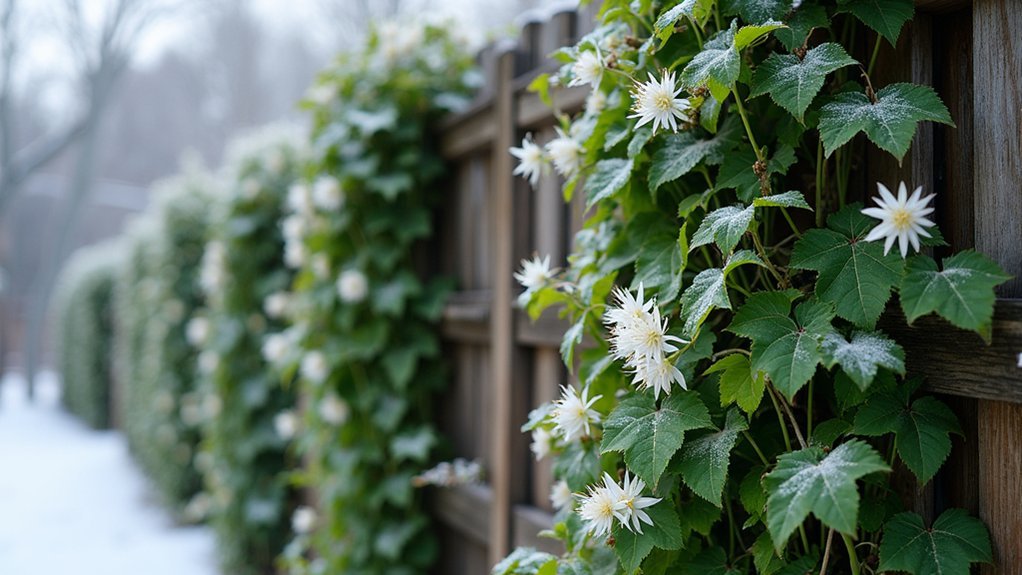
These climbers thrive against sheltered south or west-facing walls where roof eaves protect the soil from excessive moisture.
Plant in well-draining soil enriched with grit and compost to prevent winter root rot. Most varieties can withstand temperatures down to -5°C if protected from drying winds.
For support, initially tie stems to canes until they naturally twine around trellises or wires. Popular varieties like Freckles and Wisley Cream provide elegant privacy screening while offering winter garden interest.
In regions with severe winters, consider growing borderline-hardy varieties in containers that you can move to protected areas during extreme cold.
Cedar: Towering Natural Barriers For Ultimate Seclusion
Majestic and enduring, cedar trees create some of the most effective natural privacy screens in cold climates. Their dense, year-round foliage forms an impenetrable visual barrier while reducing noise pollution from neighboring properties.
Eastern Redcedar (Juniperus virginiana) stands out for its exceptional cold tolerance and adaptability to various soils. You’ll appreciate its moderate growth rate, balancing quick establishment with long-term durability. This versatile evergreen also provides habitat for local wildlife.
If you’re seeking immediate privacy, consider cedar wood panels. These ready-made screens offer instant seclusion with minimal installation effort. Their natural resistance to decay, moisture, and insects guarantees years of low-maintenance service. Available in various heights from 4.59 to 6 feet, cedar privacy screens accommodate different levels of seclusion needs.
You can shape cedar into formal hedges or let it grow naturally. With growth rates of 3-5 feet annually under ideal conditions, you’ll enjoy complete privacy sooner than you might expect.
Frequently Asked Questions
How Soon After Planting Will These Privacy Screens Reach Full Height?
You’ll see varied timelines based on your chosen plant. Fast-growing privacy screens like Cypress reach full height in 10-15 years, while others like Arborvitae and English Laurel may take 10-30 years.
Can These Plants Survive in Containers for Apartment Balcony Privacy?
Yes, you can grow privacy plants in balcony containers. Choose boxwood, dwarf evergreens, or ornamental grasses. You’ll need large containers with quality soil, frequent watering, and regular fertilization for successful growth.
Which Privacy Plants Attract Beneficial Wildlife While Deterring Pests?
You’ll find arborvitae, elderberry and viburnum attract birds and pollinators while deterring pests. Prairie dropseed naturally repels deer, while hawthorn’s thorns create bird habitat but discourage mammalian pests from nesting.
Are Any of These Plants Deer-Resistant for Rural Properties?
Yes, you’ll find many deer-resistant options for rural properties, including arborvitae “Green Giant,” boxwood, mountain laurel, viburnum, and juniper. These plants’ tough foliage, density, and natural compounds help deter hungry deer effectively.
How Do Salt Spray and Coastal Conditions Affect These Privacy Plants?
Salt spray can damage non-resistant plants by dehydrating foliage. You’ll find hollies and Arizona cypress thrive in coastal conditions, while boxwood and arborvitae might struggle. Consider adding windbreaks for additional protection.
In Summary
You’ll find that these seven cold-hardy privacy plants offer the perfect solution for your landscaping needs. Whether you’re battling harsh winters or seeking year-round screening, each option provides unique benefits. From the rapid growth of Leyland Cypress to the classic elegance of Boxwood, you’ve got versatile choices that combine beauty with functionality. Start planning your living barrier today and enjoy both privacy and natural beauty regardless of temperature.

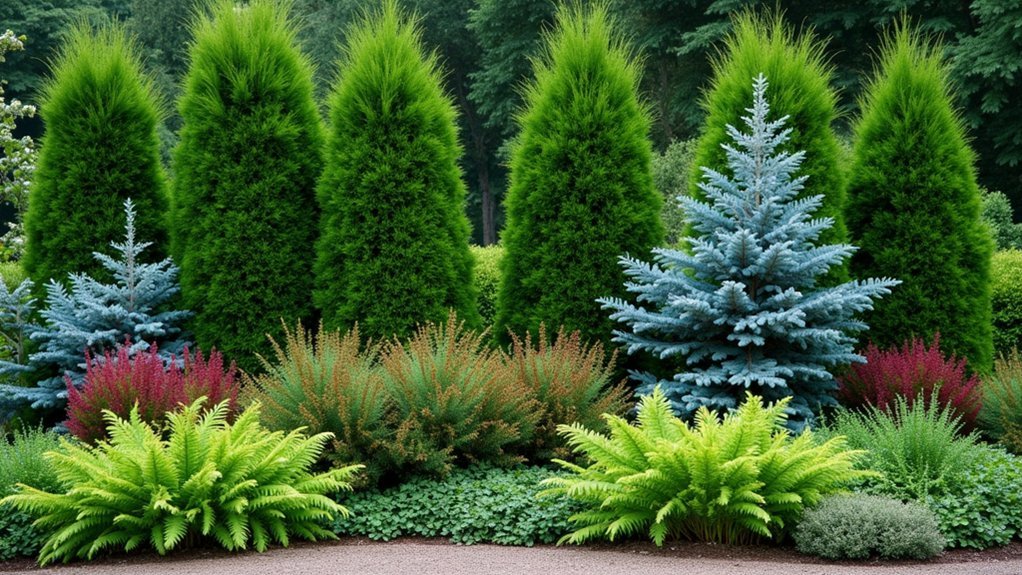

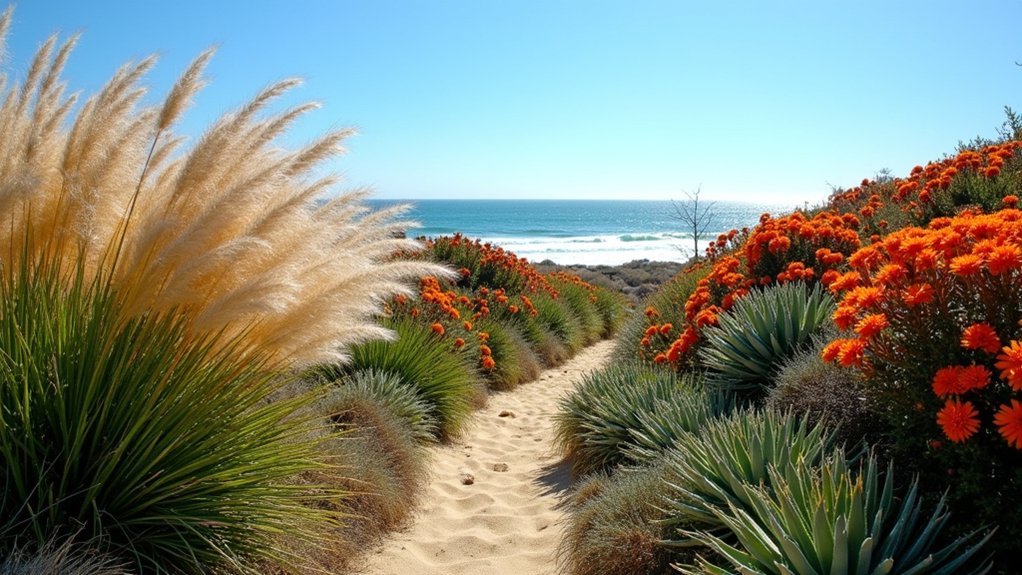
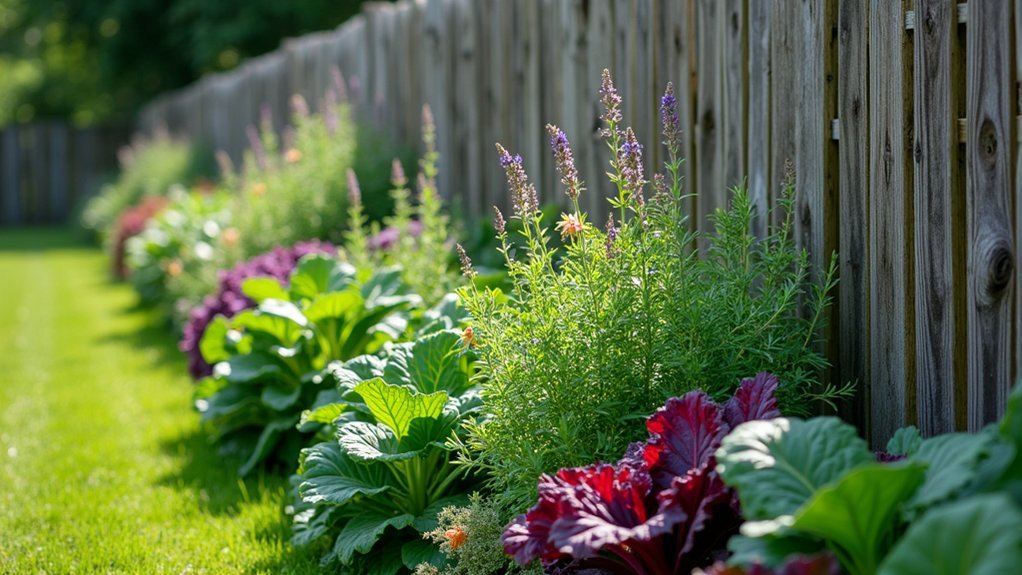
Leave a Reply